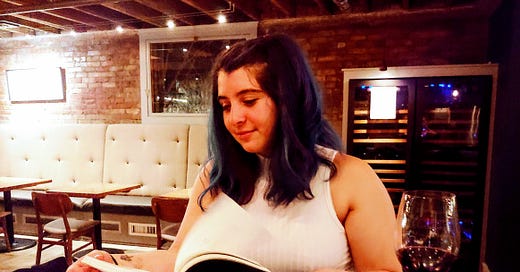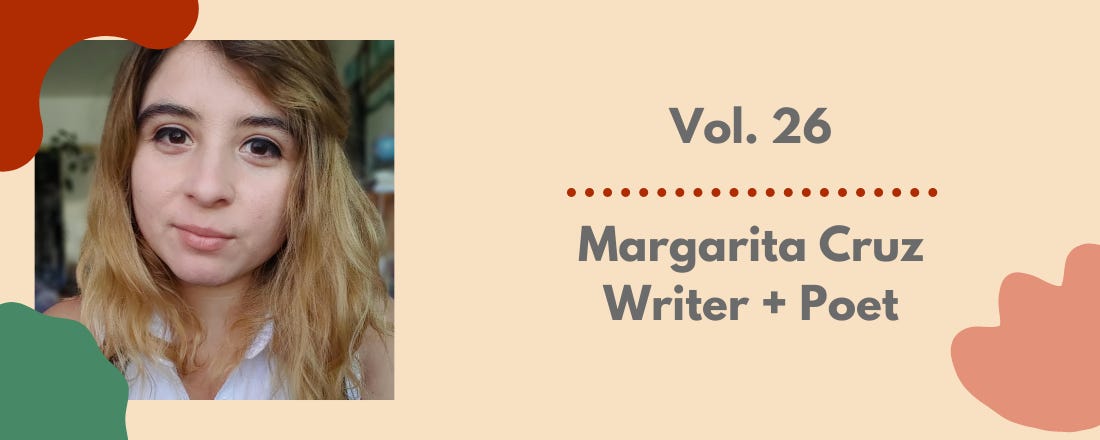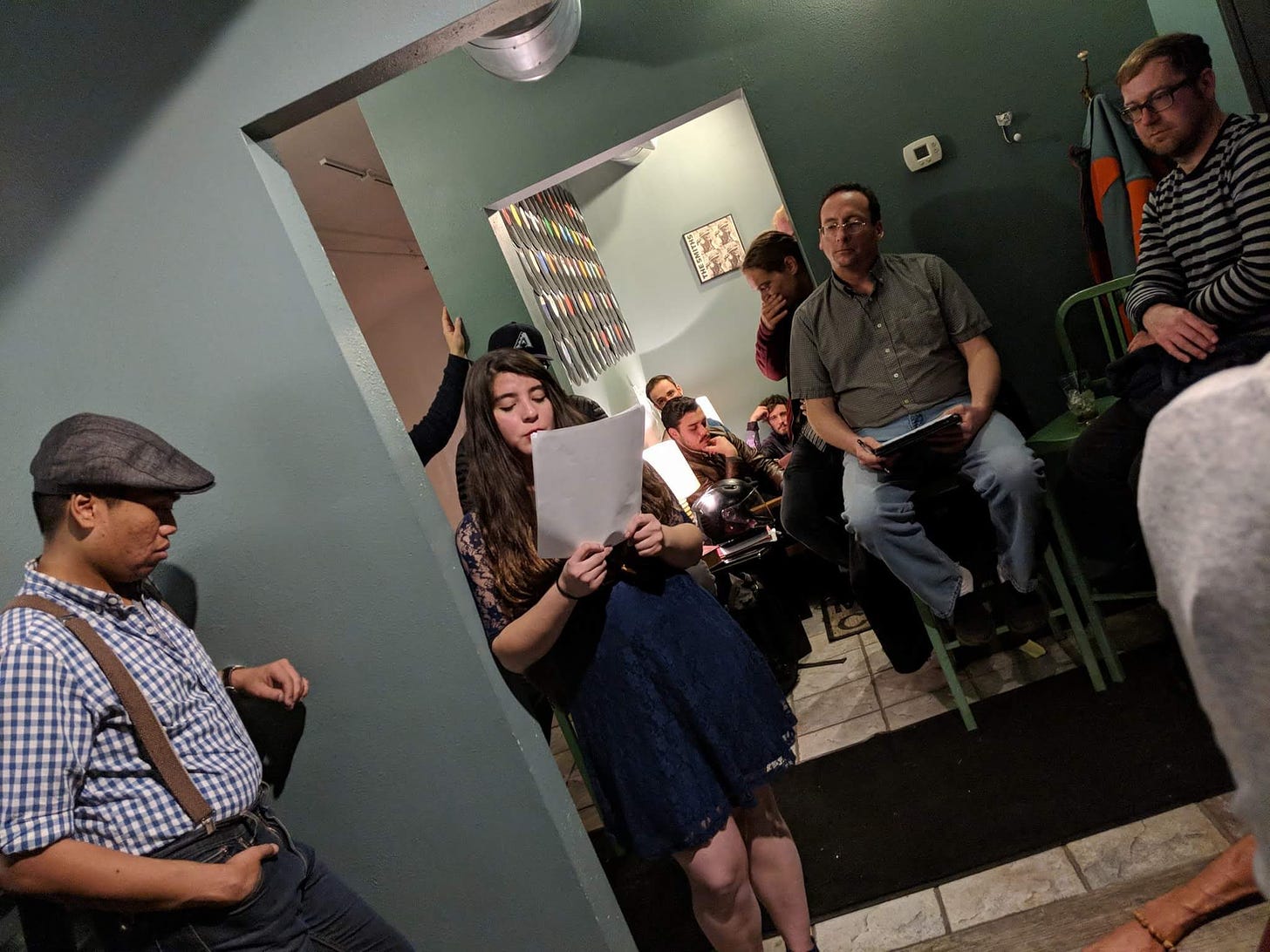A Conversation With Margarita Cruz, Writer And Poet
On building community through writing, getting an MFA, and her very organized approached to pitching lit journals
Margarita Cruz is a writer and community builder based in Flagstaff, Arizona. She received her Master of Fine Arts in Fiction from Northern Arizona University, where she was the editor-in-chief of Thin Air Magazine. Margarita is currently a columnist for the Arizona Daily Sun, vice president of the Northern Arizona Book Festival, assistant editor for Tolsun Books, and intern for The Flagstaff Foundry. She’s also a middle school teacher.
Margarita was one of the first people I met when I moved to Flagstaff, and a mutual friend told me, “There’s almost nobody Margarita doesn’t know” because she’s so connected. So I’m honored to share some of her words. In this interview, she talks about her influences and long lineage of storytelling, how she makes time for her work, how she flips between fiction and poetry, and what big project she’s gradually working toward.
What are your crafts?
I do a lot of creative writing and poetry mostly these days. I also do some journalism with an artistic focus for Flagstaff Live! and Mountain Living Magazine.
When did you first realize you wanted to write?
My family, especially my uncles and dad, is big into stories and storytelling, and it’s been a way to continue telling things that don’t get documented or videotaped or photographed. When I was younger, I really wanted to write. I wasn’t allowed to do a lot of things most other kids could do, like go outside or go to friends’ houses, so I took to reading. Then I started writing fantasy fiction when I was in the second grade. I joined this online writing community in the third or fourth grade, and it was the first time I started sharing my stories with other people.
Read Margarita’s work and see where she has been published at her website, shortendings.com.
Why did you decide to take the grad school route?
I didn’t decide until the fall semester of my senior year. By then, I was really cutting it close for a lot of deadlines. I earned two degrees in undergrad: a Bachelor of Arts in English and a Bachelor of Science in Education. I also completed a minor in French and certificates in literature and writing. It was a lot to do in four years, and I didn’t think I would want to write for the rest of my life. I had never been really confident in my storytelling even though I had been wanting to write. But during my senior year, I went through a really terrible breakup and was having a really terrible time. There was all this craziness and I didn’t know what was coming next for me. I applied to grad school in the hopes that it would just give me something to do. I didn’t want to be a teacher anymore because I had a really bad student teaching experience. So I figured I would just write. It’s still really hard sometimes because no one pays you to do what you love.
As you were going through grad school, what did the education and experience solidify for you?
It made me realize how much I love writing and need it in my life. Some people go into the MFA for networking purposes, finishing a book, getting teaching credentials, and lots of other reasons. I went into it not having any expectations. But I found out that I really love building community. It’s so life-giving. It’s like, I don’t want to teach, but I want to help create things that put people together.
Since graduating, I build community now by hanging around the new MFA kids as the oldie. I continue to interview people for Flagstaff Live! to raise other voices, meet new people, and make connections. I do a lot of volunteer work with community organizations such as the Northern Arizona Book Festival, which has been around since 1997. And I’m also working with The Flagstaff Foundry, which is an adult variety show. I’ve seen people make peanut butter sandwiches, I’ve seen people sing, I’ve seen a lot of burlesque. I’m working with them as their intern to copywrite their blog and organize workshops this summer for the first time. Additionally, I help host a radio show in Flagstaff. We curate music and poetry on Sundays for two hours. Being in the MFA taught me that these different outlets exist and that I can be a part of them.
You went into the program thinking you would be writing fiction and then poetry came out of that. How did that happen?
In undergrad, I focused a lot on fiction because I had really great fiction teachers. To get the writing certificate though, I had to take classes in all disciplines including poetry and nonfiction. On top of student teaching, I took an extra night class with Ann Cummins. It was a grad fiction workshop that she had allowed me to attend. There was one point where the class was workshopping my story, and Ann turned to me in front of everyone and said, “I think you’re a poet and not a fiction writer.” It kind of stung because I really liked my story. But I leaned into it, and poetry became my thesis. A lot of my fiction is in vignettes. I like to break traditional forms because I don’t think they’re always true to a story. So I cycle to different times and use flashbacks. I think poetry kind of encompasses this idea that writing can be anything.
Are there any topics you gravitate toward more?
I gravitate a lot toward grief. Grief of family, grief of people, grief of who you are. I wouldn’t say I lament the loss of a lot of things, but I like to meditate on the way that we lose things and the way that things are lost. When we have that transition, there’s this reframing of memory or re-examining of something. It’s not the same afterward. I really like looking at the way transition happens and hyper-focusing on it.
What’s your writing process now that you are a full-time teacher? How do you make time for it?
I try to write during my breaks. I’ve been doing Poem-A-Day for a year now. And I’ve just been trying to write something every day even if it’s just a line. It’s kind of like exercising and going to the gym. Sometimes I become really discouraged because there are nights when I’m really tired and I don’t even want to think. I’m teaching and I’m writing for the newspaper, so it takes a lot of energy. But then weeks later, I just snap back into it because if I’m not writing, I feel distracted and lethargic. I need writing.
What’s your process of submitting to literary journals? Can you demystify the process a little bit?
Take a breath and edit: If you are a person who is writing something and hoping to get it published, I would give it a day or two after finishing it and before submitting it. Sometimes in the moment we think it’s the bees knees. Really though, we need a break from it to realize any typos or mistakes. Sometimes we have a revelation about it. You don’t want to just send off anything to other people because that’s sometimes their first glimpse of you and they remember. You grow out of the work that you publish sometimes, but you also want to make sure that what you’re putting out there is the best.
Research journals: I really like researching both online and print journals. In online circumstances, you’re going to get more people looking at your work than in print unless it’s a really heavily circulated magazine or journal. I always gravitate toward online first, but also research journals that you feel like your voice fits into. I’m not going to send my work to a journal that doesn’t historically represent people like me or ideas that are not like my own just because it’s a really famous or popular magazine or something like that. It’s like you’re finding little homes for your work. It’s not only like, I really want to get published, but I also want my work to be in places that deserve to have it.
Submit and practice self-compassion: Submitting is hard. Sometimes you have five rejections and one acceptance. Sometimes you have 20 rejections and no acceptance. The more submissions you have out there, the more likely you will get a spot in there. You never have to look at these people in the eyes when you’re submitting just to have them say no to you. It comes over email. It takes days, weeks, or months. I’m a bulk submitter. I put my work into packs of poems and I submit them to seven places right off the bat. My rule for myself is that if I put something out there and I get one rejection, I have to put another one to it. That way, I always have the same amount in the queue.
Any big projects you’re working on now?
Writing projects come and go, and I think I’ll still be writing 10 years from now. I’m trying to submit my thesis to fellowships, but that’s really hard. The project that I’m slowly chipping away at is building a new press and community space center. That’s the dream job. Milkweed Editions is one example in Minneapolis. They have a press, bookstore, and community center where they host workshops and other events. That’s what I want to do, but in the Southwest.
Before you go…
A brief message from me, Amelia: Thank you so, so much for bearing with me while I took a little break from Honing Her Craft. After talking to so many women about the creative process and setting boundaries, I realized I was experiencing my own bout of burnout. So I’m grateful that this is a flexible space where I can express my own needs as a creator. I’ve spent the last few weeks working on some personal essays that may or may not see the light of day. But I’m feeling refreshed and ready for Honing Her Craft to publish once a month. Stay tuned and keep creating.








Glad to see you’re back!